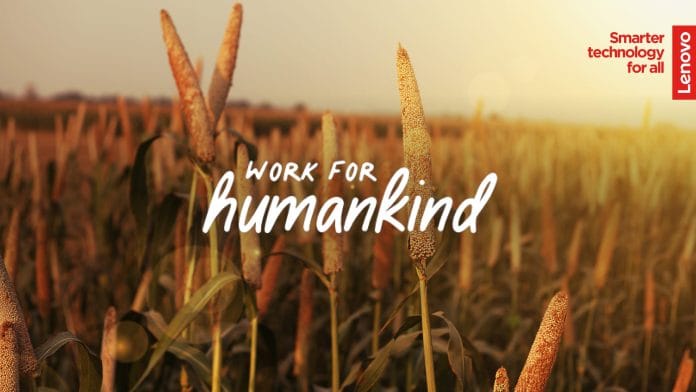Following the global success of Lenovo’s Work For Humankind initiative, Lenovo announces the launch of its India edition of Work For Humankind, which will use Lenovo’s smarter technology to revive millet cultivation in the scenic village of Kanthalloor, Kerala. In partnership with Dream India Network and local student volunteers, Lenovo employees will make a long-lasting positive impact on the millet farming community while working remotely from Kanthalloor.
Work For Humankind’s location, Kanthalloor, is a village surrounded by the Western Ghats mountains. It’s a location under constant cover of mist and evergreen forest, and a fertile agricultural paradise. Historically, over 18 varieties of millet were grown in this region, but today it has dwindled to just two types. The farmers of this village have given up on traditional millet cultivation due to factors such as climate change and a lack of formal market access. Only one tribal community, isolated deep within the protected forests, continues to grow millet for self-consumption. To revive millet farming practices in this secluded community, Lenovo’s smarter technology will play a pivotal role in improving accessibility, increasing awareness around the benefits of millet farming, and enhancing local farming knowledge and best practices. Market linkages are essential to transforming the millet food system into a profitable and sustainable model that supports rural livelihoods. Building digital inclusion for local farmers is the first step in this direction.
Lenovo employees, student volunteers, agriculture experts, and influencers with diverse skill sets will be chosen to participate in this initiative, supporting the local community in millet cultivation while continuing to work their regular day jobs remotely from Kanthalloor. The project will tap into Lenovo’s broad portfolio from devices such as ThinkPad, Yoga, motorola edge, and tablets to solutions and services like Lenovo’s CO2 Offset Service and cloud solutions. Lenovo is setting up the ‘Lenovo Digital Centre for Kanthalloor Millets’ at IHRD College Kanthalloor, the first centre of its kind for the millet farming community. The centre will be powered by Lenovo’s broad portfolio of cutting-edge devices, services, and solutions. The aim of the Digital Centre, is to become a hub that provides famers with access to critical information and best practices on millet farming, help Work For Humankind volunteers gather data and analyze the impact of implemented solutions, develops early adopters in millet production, and builds awareness for market linkages. Lenovo volunteers will be working to provide digital access to information on government programs and millet cultivation methods to key stakeholders within the local community. This intervention will work towards improving the technological access of the community at large, addressing the overarching challenge of the ‘digital divide’ in the region.
Alsi Read: How to Check Your RAM Speed in Windows 11
The United Nations declared 2023 as the ‘International Year of Millets’, and subsequently the national and global millet value chain has seen significant increases in productivity and momentum. However, several marginalized farmers who run smaller, independent operations in pockets across India have not been able to leverage the benefits. Reasons being: lack of awareness, lack of skill sets, limited market linkages, and inaccessibility to the latest agri-tech. These barriers have led to inefficient production and little to no profitability. To bridge this gap, Lenovo employees and student volunteers will collaborate with partners to run an in-depth analysis of the local millet food system and prototype a model to help farmers cultivate millet through sustainable farming practices. By the end of the initiative, the students at the IHRD College will be trained to continue this work and help ensure that insights from this work are correctly used, and that positive changes are long-lasting.
Lenovo’s global research on the link between technology and humanity recognizes that technology is instrumental in fulfilling modern employees’ desires to work remotely in a location that also offers them the opportunity to give back. The creation of the ‘Work-from-Anywhere’ model is essential as many Gen Z employees in the workforce believe philanthropy and making a positive impact within communities is important. In fact, Lenovo’s research highlighted that a third of respondents in India would use their spare time while “working from anywhere” to volunteer and give back to the local community. At Lenovo, this belief is captured in the Work For Humankind initiative, which combines the vision of delivering smarter technology for the millet farming community in Kerala, with the volunteer work of skilled employees, to address their most pressing needs.





